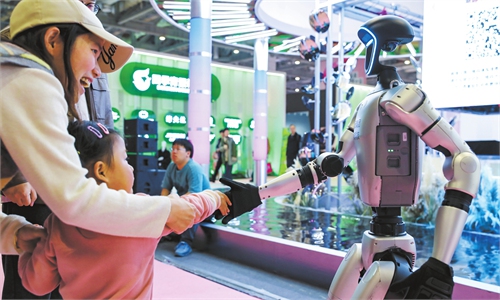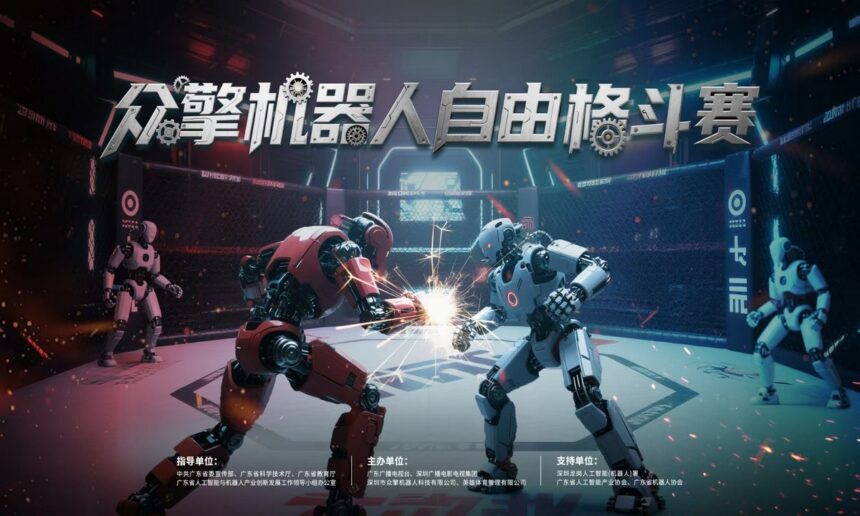
In a groundbreaking event that promises to revolutionize the field of robotics, Shenzhen, located in South China’s Guangdong Province, is set to host the world’s first-ever full-size humanoid robot combat tournament in December. Titled the EngineAI Robot Free Combat Tournament: “Mecha King”, this event is poised to push the boundaries of artificial intelligence (AI) and robotics, offering a unique blend of technology, competition, and entertainment.


A Milestone in Robotics and AI Innovation
The tournament aims to test the physical and intellectual limits of humanoid robots in a highly competitive and visually engaging environment. Organizers envision the event as an arena where robots will simulate human-like movements and engage in real-time, intelligent decision-making, all within the complex and dynamic conditions of combat. With robots requiring to adapt to unpredictable combat scenarios, the event promises to showcase how AI can enhance the machines’ agility, adaptability, and decision-making capabilities.
The competition will also introduce pioneering rules that challenge robots to mimic human movements while ensuring that their actions are responsive to their surroundings. This approach will be a true test of the robots’ potential to handle physical challenges and think critically in combat situations.
China is set to host the first humanoid robot arena competition in late May, focusing on direct physical confrontation between full-size bipedal robots.
Participants will demonstrate real-time control, stability, and force capability under high-impact conditions—marking a new… pic.twitter.com/9Cl1RMlFgo
— Reborn (@reborn_agi) May 15, 2025
EngineAI Leads the Charge in Humanoid Robotics
EngineAI, the Shenzhen-based robotics company behind the tournament, will provide several humanoid robot models for the competition. The company plans to open-source the robot codes, allowing participants to customize the robots and tailor their machines for maximum performance. This open-source approach aligns with the company’s vision to foster innovation, with teams able to train and fine-tune the robots for a variety of competitive scenarios.
#ICIF | Get ready for the world’s first combat tournament with full-sized #humanoid #robots in #Shenzhen this December! 🤖💥 The EngineAI Robot Free Combat will test humanoid robots’ skills in decision-making, coordination, and physical interaction. Organizers announced it at the… pic.twitter.com/DrSMlX2aOq
— Hi,GBA (@thisisGBA) May 22, 2025
Yao Aiwen, co-founder of EngineAI, emphasized the importance of the competition in accelerating the development of more agile, smarter, and stronger robots. “This event leverages the robust robotics ecosystem of the Guangdong-Hong Kong-Macao Greater Bay Area and combines sports with AI technology, driving breakthroughs in key technologies such as robot perception, decision-making, and execution,” said Yao.
The ultimate goal of the tournament, according to Yao, is to create humanoid robots capable of performing tasks like dancing, exercising, and even combat. These advancements will allow robots to be made lighter and more adaptable for practical applications in people’s daily lives and industries such as manufacturing, service, and healthcare.
#ICIF | Get ready for the world’s first combat tournament with full-sized #humanoid #robots in #Shenzhen this December! 🤖💥 The EngineAI Robot Free Combat will test humanoid robots’ skills in decision-making, coordination, and physical interaction. Organizers announced it at the… pic.twitter.com/DrSMlX2aOq
— Hi,GBA (@thisisGBA) May 22, 2025
Preparing for Battle: Hangzhou Hosts the First Robot Combat Competition
In addition to the upcoming Shenzhen event, another significant milestone for robot combat takes place in Hangzhou, East China’s Zhejiang Province, where the world’s first-ever robot fighting competition will be held on May 25. This event will feature humanoid robots engaged in both demonstration and competitive matches, showcasing their combat capabilities and precision control by human operators.
Unitree Robotics, a Hangzhou-based robotics start-up, is partnering with the event’s mecha fighting arena. Their robots have undergone rigorous stress tests to ensure combat readiness, focusing on improving balance and stability, essential for high-performance fighting. Chen Xiyun, marketing manager at Unitree, highlighted how the algorithms optimized for these extreme conditions could benefit real-world applications, such as improving robot stability when handling heavy loads.
Transforming Robotics for Real-World Applications
Experts believe these competitions are not only testing robots’ ability to fight but are also refining algorithms that could have a direct impact on their performance in various industries. Wang Peng, an associate research fellow at the Beijing Academy of Social Sciences, stated, “What we’re witnessing is the transition of precision robotics from the lab to the real world. These events provide a platform to test robot technology and train relevant talents, accelerating the large-scale deployment of humanoid robots across different sectors.”
A Hub for Robotics Innovation
The growing interest and investment in humanoid robots are evident in the developments taking place in Zhejiang and Guangdong provinces. Zhejiang is home to more than 200 robotics-related companies, with the robot industry’s output value expected to reach 15 billion yuan by 2024. Meanwhile, Guangdong’s industrial robot output exceeded 240,000 units in 2024, marking a year-on-year growth of 31.2%. The province now manufactures one-third of all industrial robots in China, making it a global leader in robotics production.
These events are symbolic of the rapid advancements in the robotics industry and the drive to integrate humanoid robots into practical applications, from industrial tasks to personal assistance. As humanoid robots increasingly become part of our technological landscape, tournaments like “Mecha King” are helping to push the boundaries of what these machines can do.
Conclusion
The EngineAI Robot Free Combat Tournament: “Mecha King” in Shenzhen and the inaugural robot combat competition in Hangzhou mark a pivotal moment in the evolution of humanoid robots. These events are not only offering a glimpse into the future of robotics but are also laying the groundwork for broader applications of AI and robotics technology in real-world scenarios. As the robotics sector continues to grow, these competitions will play a crucial role in shaping the next generation of intelligent machines that could soon become a part of our daily lives.












